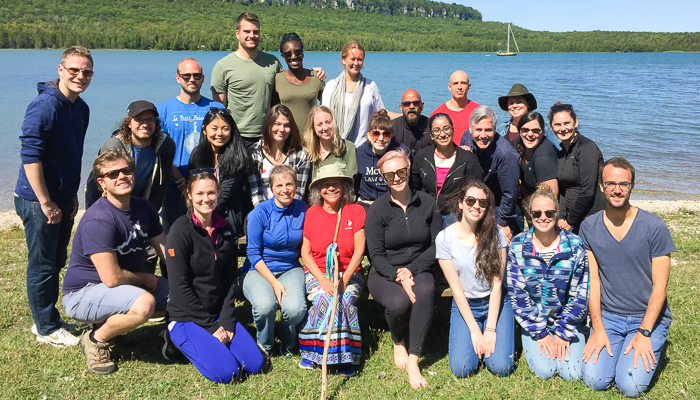
In August, a group of law students and professors embarked on the ten-hour drive to Georgian Bay to spend four days learning about Indigenous law with the Chippewas of Nawash First Nation.
“Transformative, profound, and eye-opening”; those were the words a student used to describe the field workshop that kicked off their fall semester. August 31, they were part of a group of 23 students and professors who embarked on the ten-hour drive to Georgian Bay, Ontario, where they were to learn about Indigenous law at the Chippewas of the Nawash First Nation. Distinguished Tomlinson Visiting Professor John Borrows (uVic), who is Anishinaabe and Ojibway, and a member of the Nation, led the workshop.
Over the four-day stay, a welcome break in our summer’s rainy weather allowed for classes to be held outdoors. In addition to Professor Borrows, the group of teachers included community elders Charlene Jones, Joanne Keeshig, Wendal Nadjiwon, Jean Borrows and Tony Chegano, as well as Dr. Heidi Kiiwetinepinesiik Stark, associate professor of political science at the University of Victoria, and lawyer Hannah Askew who practices in Aboriginal and natural resources law. The students were initiated to Anishinaabe law by learning how they regulate their behavior, and resolve disputes in a community context. Lessons like “Learning Law from/about Water”, and “Learning Law from/about Treaties & Legal Histories” challenged the students’ habit of relying on texts for legal knowledge; over the law camp, they worked with sources of Anishinaabe law found in traditional stories, the environment, treaties, declarations, and customs.
Come nightfall, each student had the opportunity to spend the night alongside the fire keeper, or to sleep in the Community Center. “The community members were generous and caring hosts, who spared no effort for us,” said Assistant Dean Véronique Bélanger. “From preparing delicious meals to guiding us through traditional activities, they did everything to make us feel a true part of their community for a few days.”
Asked about their key takeaway, many students referred not only to Anishinaabe law, but also to their relationship to law as a whole. “I learned that we can only offer what we have in our hearts, so I was happy to have this opportunity to consider what I have in mine before I go to offer services as a lawyer,” wrote one of the participants.
“This course was an important reminder that law exists through human expression and experience, and as future jurists that however we do law will be performed physically through us. Framed in this way, law becomes a deeply personal process,” concluded another student.
